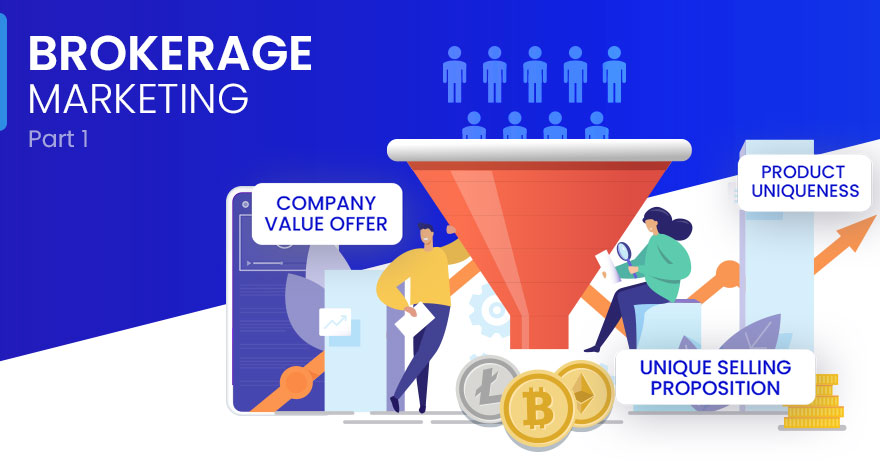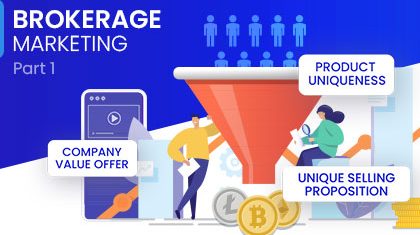
Web-based Vs Desktop Trading Platform, Which is Better?
November 2, 2021
Panda. Brokerage Marketing 102
November 23, 2021
Part 1: The Basics. Then and Now
The First-Movers
As with every market, the newer it is, the easier it is to attract new leads and convert them into loyal customers. It was the same with online trading in the earliest days. As long as you had a website that looked reasonably professional, a registration process that didn’t crash, and a platform that was easy to download and install, you were almost guaranteed a steady stream of new clients. This was because you were offering something new (real market access for retail clients), which wasn’t at all widespread at the time. If your marketing department was also able to splash out on a high profile football or motorsport sponsorship, even better. You could plaster the team’s star players or sleek Formula 1 cars all over your website and marketing materials to show the world just how legit you were.
The Copy/Paste Stage
As a market matures and the regulatory framework solidifies around it, what you can do in terms of business practices becomes limited (e.g leverage restrictions), this happens as the industry grows and more brokers come to market. So, more constraints, more competition. The formula that the earliest companies invented is copied by everyone and it’s much harder for newer companies to create the same kind of buzz and brand awareness as the first-movers. This is the stage where a broker’s offering comes into play. How many individual symbols and asset classes are available to trade? What are the platform options? How tight are the spreads? The copy/paste stage is where competitors are judged on the small advantages one has over the other in a market where the first-movers still dominate in terms of brand awareness.
Inevitable Disruption
Eventually, something comes along to shake things up and forces the market to change. In the late 2000s, STP (straight-through processing), or “no dealing desk” brokerage became all the rage as the first generation of retail traders started understanding how the b-book business model works and began sharing this with each other on blogs and forums. The bigger brokers rebranded themselves as “no conflicts of interest” intermediaries (a-book) that just pass client orders on to the market. This led to a great deal of innovation in brokerage tech (connectivity solutions, liquidity aggregation, platform development) and a sense that the industry was moving towards higher levels of professionalism and mass adoption.
Then, after the worst of the 2008 financial crisis was over and stock markets started looking like an attractive source of returns again, the industry pivoted towards the idea of multi-asset brokerage. Don’t forget that one of the reasons FX trading exploded in the first place, was because there were limited returns to be had elsewhere post-2008, causing investors to start thinking of FX as an asset class in its own right. The move to multi-asset brokerage was an attempt to stay relevant regardless of the market regime. FX/CFD brokers were already doing it with precious metals and energy CFDs, but now many companies dropped the “FX” part of their names to replace it with “Markets.” Suddenly, an arms race developed between brokers trying to pack as many individual names from as many asset classes as possible into their offering.
The birth of crypto as an asset class was another disruptive event. Some brokers chose to ignore it, others pivoted towards it, the rest found a way to manage the risk of this highly volatile new asset class and bring it into their existing offerings.
Similar shake-ups have also taken place in the regulatory environment. We’ve gone from little or no regulation, to a division between strict and loose jurisdictions (and the regulatory arbitrage they entail), to a world where the major regulators are now largely reading from the same hymn sheet.
The important thing to remember about disruptive stages, is that they can come at any time and your business has to be both agile and flexible when it comes to change. Being first off the mark allows you to associate your brand with an evolving space before the rest of the market catches up and starts playing the copy/paste game again.
In today’s CFD market you will find brokers still working in all the modes outlined above. But regardless of the market environment, the state of competition in the industry, or the disruptive forces at work at any given time, there are some tried and tested ways to give your brokerage business the edge.
Educate Your Staff
An area you don’t hear discussed very often is how educated your support, sales and retention teams are. Most brokerage employees receive a crash course in a few areas of brokerage life that impact their specific roles. However, the brokerages that have historically done the best have invested heavily in making their front line people experts in all areas that are relevant to their clients. How do you sell your services to a trader when the salesperson knows less than the trader? How confident does a prospective client feel about making a deposit when the customer support agent they spoke to had no real answers? Education is difficult to quantify as an investment, but it truly separates the market leaders from the rest of the field.
(Not All) Content is King
The copy/paste approach to marketing has a lot to answer for, but nowhere is its effect more present than in the content used by most brokerages to attract people to their services. Whether it’s the cookie-cutter parallax websites with bold headlines and the same five bullet points, the education that doesn’t educate, or the dry technical analysis that no one can understand, everyone seems to agree that content is king, but not many manage to get it right.
Again, this is almost the same as the previous point. The efforts that go into teaching your own people how markets work, how the company platform does what it does, what just happened when a central bank abruptly raised its interest rates; these should also be repurposed to educate your clients. You need to have people working for you who know how to tell your story as a company, as well as the main stories currently playing out on the world’s markets.
Expertise lends credibility to your business at every level. Don’t forget, traders are becoming smarter and savvier by the day as their access to professional trading content increases. If you don’t step up your game in this respect, you can quickly end up looking like a business that’s trying to fake it before it makes it. Content is not a box to tick on your marketing manager’s to-do list. It’s a very long game that you must invest time and energy into growing and developing in order to differentiate your brand.
Next time we will delve further into what you can do right now to increase brand awareness and the effectiveness of your brokerage’s marketing endeavours. Join us in Part 2!
For free consultation
Request a Call
